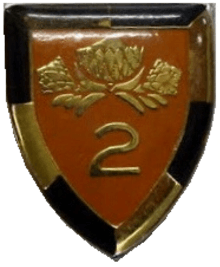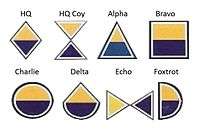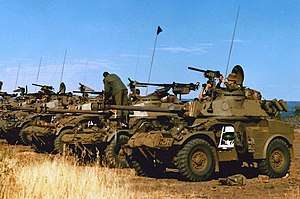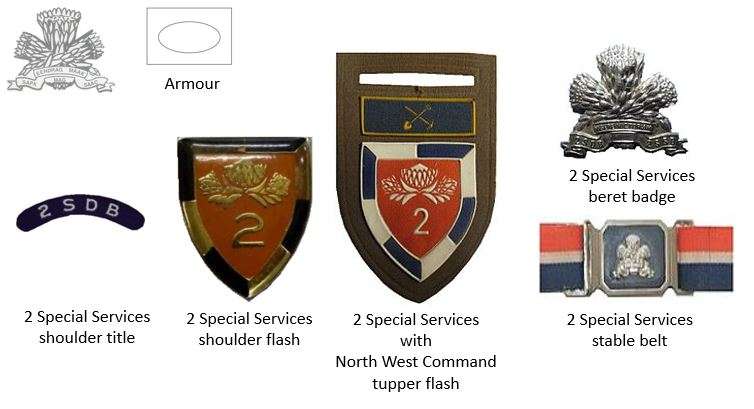2 Special Service Battalion
2 Special Service Battalion (usually abbreviated to 2SSB) was an armoured regiment of the South African Army and only one of two such in its regular force. The Regiment was based at Zeerust. It was previously known both as in English 2 Special Service Battalion, and in the Afrikaans Language as 2 Spesiale Diens Bataljon (2 SSB and 2 SDB).
| 2 Special Service Battalion | |
|---|---|
 2 Special Service Battalion emblem | |
| Active | May 1946-1997 |
| Country | |
| Branch | |
| Type | Armoured |
| Part of | South African Armoured Corps |
| Garrison/HQ | Zeerust |
| Nickname(s) |
|
| Motto(s) | Agere Victoriam” (Strive for Victory) |
| Colors | Orange over Blue which must be divided by Silver and where it is not possible to use silver white will be used in place |
| Equipment | |
| Engagements |
|
| Website | www.saarmour.co.za |
| Commanders | |
| Notable commanders | |
| Insignia | |
| Beret Colour | Black |
| Armour Squadron emblems |  |
| Armour beret bar circa 1992 |  |
History
2 Special Service Battalion was founded on 1 May 1946 at Potchefstroom. The S.S.B. was a military unit formed to take in unfortunate young men who were unable to find employment at the time. Before World War II the Special Service Battalion was re-organized into 2 battalions – 1st and 2nd Special Service Battalion. In 1946 after World War II the South African Armoured Corps, was thus officially proclaimed and the Special Service Battalion was included in the corps as the only full-time unit, its symbols and colours were incorporated.
Infantry
Initially, the sole purpose of 2 SSB was to train members of the Permanent Force as Infantrymen. 2 SSB was put into service officially on 21 February 1947 and on 26 January 1951 the name changed from 2 SSB to 1 South African Infantry Battalion (1 SAI). 2 SSB can thus be seen as the founding unit of the South African Infantry Corps.
Armour changeover
C-Squadron of 2 Armoured Car Regiment was founded during February 1962 with its official base at Zeerust. On 22 December 1966 the name was adapted to C-Squadron 1 SSB.
On 1 October 1973 2 SSB, born from C-Squadron 1 SSB was resettled. The headquarters of the Regiment as well as C-Squadron 1 SSB was stationed at Zeerust, while D-Squadron 1 SSB was detached to 2 South African Infantry Battalion at Walvis Bay.
Border War
Several squadrons have taken part in the war in Namibia and Angola since 1974. From 8 October 1975 to 31 January 1976, B-, C- and D-Squadron took part in Operation Savannah. This border duty was continued with significant participations in Operation Protea, Daisy, Hooper and Modular.
On 25 January 1988, 2 SSB became the first unit in South Africa to receive the Right Of Free Admission to a coloured community, namely Henryville.[1]

Bophuthatswana coup d'état
On 10 February 1988, 2 SSB took part in Operation Adding during which President Lucas Mangope and his government was returned to power, after a failed coup d’état.
Rooikat Conversion
In May 1990, 2 SSB received the first Rooikat armoured cars and on 30 June its National Colours.
Corps Change ARMOUR to INFANTRY
On 31 December 1992, as part of the reduction of the SA Army after withdrawal from SWA- Namibia (Resolution 435), 2 SSB underwent a change in role. The unit was transformed from an Armoured Car Regiment to a Motorised Infantry Battalion and provided with an operational company (A-Company) which was transferred from Group 20.
During the historical General Elections of 1994, 2 SSB took part in Operation Baccarat (stability in Mmabatho and Passado (border protection) as a peace force to ensure stability in the North West Province).
On 19 December 1994, the Bophuthatswana Defence Force Parachute Battalion at Gopane was placed under operational command of 2 SSB, as part of the founding of the SANDF. 2 SSB withdrew simultaneously from Nietverdiend and Nooitgedacht. From August 1994 to 15 June 1995 successful bridging training was provided for 550 formerly non-statutory force members.
Disbandment
Early in 1997 the rationalisation of the Defence Force was announced and 2 SSB was one of the battalions that had to close down. 2 SSB amalgamated with 10 SAI on 1 April 1997 in Mafeking. 2 SSB was closed down on 30 August 1997 after the handing over of the base to 2 SAI Battalion.
Regimental symbols
- The cap badge is a spray of three protea flowers, bound by a ribbon bearing the initials and motto.
- Regimental honour roll : Soldiers who died during active combat duty and soldiers who died during training. See 2 SSB Roll of Honour
Dress Insignia

Honour Roll
- Baker, E. 1990[2]
- Brink, C.M.1978
- Burger, W.J.1974
- Cronje, D.J. 1987
- De Lange, J.H. 1983
- De Lange, P.H. 1983
- Du Plessis, J.C. 1988
- Elsworthy, D.M. 1978
- Erasmus, E. 1988
- Eybers, P.G. 1975
- Hanekom, J.M. 1981
- Helm, H.C. 1985
- Jansen van Vuuren, F.H. 1984
- Lecuona, M.J. 1988
- Meerholz, J.R. 1980
- Muller, A. 1976
- Muller, D.M. 1979
- Muller, P.J. 1982
- Naude, D. 1983
- Obbes, G.M.F. 1975
- Oberholzer, W. 1981
- Randall, J.A.S.T. 1984
- Scott, G. 1988
- Stassen, P.I.M. 1983
- Steyn, D.A. 1981
- Taljaard, J.J. 1975
- Truebody, H.C. 1978
- van Rooyen, G. 1988
- van Wyk, W.A. 1988
- Viljoen, M. 1987
- Volgraff, G. 1975
- Ziemkendorf, H. 1987
Alliances
Leadership
| From | Honorary Colonel | To |
| 6 August 2020 | Unknown | 6 August 2020 |
| From | Officer Commanding | To |
| October 1973 | Colonel G.D.M. Coetzee | January 1975 |
| February 1975 | Colonel A.J. Snyman | December 1977 |
| January 1978 | Commandant J.W. Roos | June 1978 |
| June 1978 | Commandant A.C Slabbert | December 1981 |
| December 1981 | Commandant T.B. Beyleveldt | December 1984 |
| December 1984 | Commandant H.J. Kriek | December 1986 |
| January 1987 | Commandant C.J. du Ruan | December 1988 |
| December 1988 | Commandant J.C. Smith | December 1990 |
| December 1990 | Commandant A.J. van Jaarsveld | December 1992 |
| From | Regimental Sergeant Major | To |
| October 1973 | WO1 L.J. Fourie | December 1977 |
| January 1978 | WO1 R.D. Oosterlaak | November 1980 |
| December 1980 | WO1 F. Kretsinger | December 1986 |
| January 1987 | WO1 H.J. Venter | June 1992 |
| July 1992 | WO1 D.J. Cloete | December 1992 |
See also
South African Armoured Corps